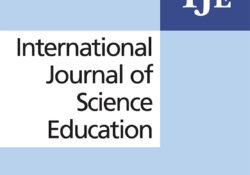tandfonline.com har udgivet en rapport under søgningen “Teacher Education Mathematics”: ABSTRACT ABSTRACT This paper explores students’ ability to analyse and interpret empirical data as inadequate data analysis skills and understandings may contribute to the renowned disappointing outcomes of practical work in secondary school physics. Selected competences, derived from a collection of leading curricula, are explored through interviews and practical tasks, each consisting of three probes. The 51 students, aged 15 and commencing post-compulsory science education in the Netherlands, were able to carry out basic skills such as collecting data and representing these. In interpreting the data in terms of the investigated phenomenon or situation however, performance was weak. Students often appeared to be unable to identify the crucial features of a given graph. Conclusions based on the data were often… Continue Reading →
Like this:
Like Loading...
tandfonline.com har udgivet en rapport under søgningen “Teacher Education Mathematics”: ABSTRACT ABSTRACT Mathematics competency is fast becoming an essential requirement in ever greater parts of day-to-day work and life. Thus, creating strategies for improving mathematics learning in students is a major goal of education research. However, doing so requires an ability to look at many aspects of mathematics learning, such as demographics and psychological dispositions, in an integrated way as part of the same system. Large-scale assessments such as the Programme for International Student Assessment (PISA) provide an accessible and large volume of coherent data, and this gives researchers the opportunity to employ data-driven approaches to gain an overview of the system. For these reasons, we have used machine learning to explore the relationships between psychological dispositions and mathematical literacy… Continue Reading →
Like this:
Like Loading...
tandfonline.com har udgivet en rapport under søgningen “Teacher Education Mathematics”: ABSTRACT ABSTRACT More than 50 years ago, John Tukey called for a reformation of academic statistics. In “The Future of Data Analysis,” he pointed to the existence of an as-yet unrecognized science, whose subject of interest was learning from data, or “data analysis.” Ten to 20 years ago, John Chambers, Jeff Wu, Bill Cleveland, and Leo Breiman independently once again urged academic statistics to expand its boundaries beyond the classical domain of theoretical statistics; Chambers called for more emphasis on data preparation and presentation rather than statistical modeling; and Breiman called for emphasis on prediction rather than inference. Cleveland and Wu even suggested the catchy name “data science” for this envisioned field. A recent and growing phenomenon has been the… Continue Reading →
Like this:
Like Loading...


